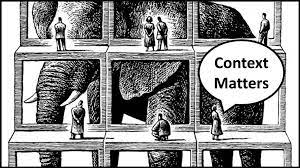A little context can make a big difference. The book of Acts is filled with history and culture that is foreign to our experience so I thought it might be helpful to share some of the information I’ve learned over the years.
Acts 2:42-47 is a famous description of the early church and the “glad and sincere hearts” they possessed. The text shares that they devoted themselves to four things. In my Greek-thinking mind, I tend to study them as separate entities but in the Hebrew mind (remember that this was a Jewish-Christian church) these four were woven together within the fabric of community.

In that culture sharing a meal, social interaction and Torah study with discussion were a part of Jewish life. Engaging with the Torah, word and way always included social interaction and social interaction always included Torah, word and way. This was a sharing of life and faith that went way beyond coffee on Sunday morning. Think of how this would be in your own life if every meal and every conversation included either direct discussion on or references to Holy Scripture. This emphasis was so much a part of their daily discourse that if social interaction did not include discussion of or reference to God’s Word, then it was felt that the absence of Torah-talk was evidence that God's Word had not yet reached that person’s heart. Stop and ponder this a moment. This one insight alone would be worth talking about with your family or friends. How can we more fully weave “gospel-talk” into the fabric of our 21st century social interactions?
Let’s jump forward to Paul’s circumcising Timothy in Acts 16:1-5. To view it in context, we need to recognize how what precedes it influences our interpretation. Acts 15 is a marvelous picture of the early church answering a question which would have a profound impact on its future. Do Gentile converts to Christ need to be circumcised in order to be saved? After many words and lots of emotion, church leaders determined that Gentile converts did not need to submit to circumcision to become Christ-followers! It was a HUGE deal as Paul’s ministry and teaching was confirmed as true. How did Paul respond? What’s the first thing he did the moment he found a new mission partner named Timothy, a man who had a Gentile father and a Jewish mother? He circumcised him! Really? Does this not fly in the face of all Paul was arguing for in chapter 15? What gives here?
In Jewish society, while “legal responsibilities and entitlements” are passed to the son by the father, confirmation of one’s Jewish heritage is passed to the children by the mother. The question of who is a Jew is an important one to answer because it determines who is and who is not excluded from God’s covenant with His people. Timothy’s mother and grandmother were Jews who placed their faith in the Messiah. These two women had a sincere faith that they passed along to Timothy as they taught him the scripture from an early age (2 Timothy 1:5, 3:15). As a Jew, Timothy had never been circumcised and he needed to be in order to fulfill the law. Did he need to be circumcised to be saved by faith in Christ? No. But “because of the Jews who lived in that area” Paul thought it best to do so. Did Paul do this to appease this audience? Probably not. Did he do this just to make it easier to share the gospel with those Jews? Maybe. Did he do it because, as a Pharisee who fully followed the law himself, he desired to help set things right for his new disciple, Timothy? Possibly. We can’t be certain of Paul’s heart-motive, but we can be certain that Timothy was considered to be a Jew and not a Gentile and this one fact puts the entire story in a different light.
I want to wrap up with one more from Acts 20:7-10, the story of Eutychus falling from a window on the third floor. Did you ever wonder what kind of a building would have a third floor and space for lots of people to meet? Considering this question requires us to look at housing in first century Roman and Jewish world.
The disciples all came from smaller towns and so were raised in their “father’s house.” This “house” (called an insula) was usually a collection of ground-floor apartments (rooms), sharing a common roof, surrounding an open courtyard and inhabited by an extended family. The house increased in size whenever a daughter was added by marriage. When one of the sons became betrothed, he would leave his bride to return to the father’s house in order to build an additional room onto the house. Once the father determined that everything was in place, the son would return to his bride and bring her to their new home. (Knowing that the church is called the Bride of Christ, this might be a good time to reread John 13 and 14 and ask the Lord to speak to you again on this important topic.) How does this relate to Eutychus? Well, the insula was not just used for Jewish families.
In larger Roman cities, the insula became a multi-level apartment complex housing many different families. These insulae (plural of insula) were crowded tenement buildings which lacked any heat, running water or sewage and were occupied by everyone from lower class to upper middle class. The ground floor usually contained merchant shops with the merchant’s family (and others) living in the upper floors which were accessed by an outer staircase. Eutychus likely fell from the window of a Roman insula, a neighborhood that was quickly becoming impacted by the gospel. It begs the question for me: In what way does my faith impact my neighbors?
If you are interested in this sort of thing feel free to use a commentary (like The Jewish New Testament Commentary) or biblical history reference (like The Archaeological Study Bible) as you read. While reading the Bible alone is great, a little context can make a big difference in how we understand what we read.
Enjoying the view and the journey with you,

Rob






